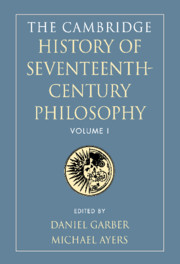Introduction
Published online by Cambridge University Press: 28 March 2008
Summary
The Cambridge History of Seventeenth-Century Philosophy was planned to provide a comprehensive overview of European philosophy in the seventeenth century in a series of contributions, each written by an appropriate specialist or group of specialists. As in the immediately previous volumes in the series, and in deliberate contrast to most histories of philosophy, the subject is treated by topic or theme, rather than chronologically or by individual. Since history does not come in neat bundles, our response to the boundary problems engendered by such a project has been deliberately flexible. First, we have allowed our subject-matter to overflow, with the oeuvres of individuals and with particular debates, into the adjacent scenturies. Contributors have also been encouraged to explicate the meaning and wider significance of seventeenth-century argument by reference to antecedent or, if it seemed appropriate, consequent theory. The former has often meant reference both to mediaeval and Renaissance ideas and to the antiquity directly studied and avidly plundered even by some of the reputedly most ‘modern’ philosophers. The geographical scope of the volume is admittedly more restricted, although we are pleased to be able to include one chapter on the intense interest of some European philosophers in Chinese culture and thought.
Second, we have allowed some compromise between what the term ‘philosophy’ meant then and what it means now. In the seventeenth century it was unremarkable if the same 'philosophers' who wrote on metaphysics, logic, ethics, and political theory, on the existence of God, or on the varieties of human knowledge and belief also made contributions to mathematics, offered an account of the laws of motion, peered through microscopes or telescopes, recorded the weather, conducted chemical experiments, practised medicine, invented machines, debated the nature of madness, or argued about church government, religious toleration, and the identity and interpretation of divine revelation.
- Type
- Chapter
- Information
- Publisher: Cambridge University PressPrint publication year: 2000



